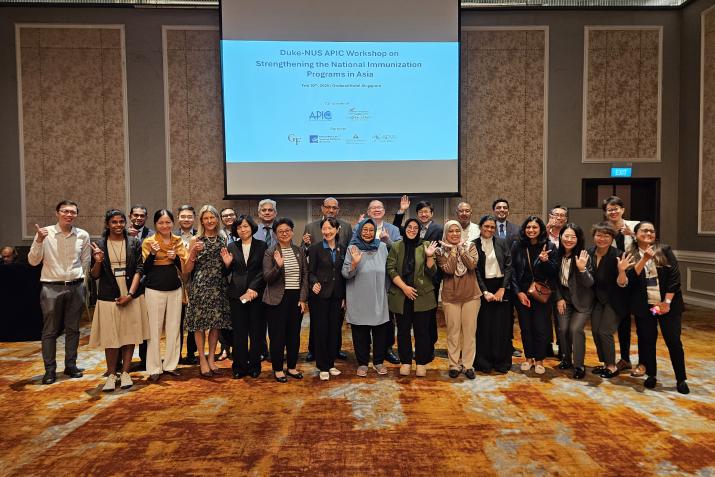
Participants at a Feb. 10 workshop in Singapore to discuss challenges in vaccine coverage across 13 Asian countries.
Published February 21, 2025 under Partnerships
Asian countries that graduate from donor funding programs face unique challenges in introducing new vaccines to national immunization programs, a new report from the Innovation Lab for Vaccine Delivery Research(VaxLab) finds.
The report, which is available on the website of the Asia Pacific Observatory on Health Systems and Policies (APO), highlights the disparities in vaccine coverage and inclusion of vaccines in national immunization programs in 13 Asian countries. While vaccine coverage rates were high in all countries, middle-income countries that are no longer eligible for donor funding through organizations such as GAVI, the Global Vaccine Alliance, covered the fewest vaccine-preventable diseases in their national immunization programs.
Policymakers, researchers and leders of international organizations from across Asia discussed the report's findings at a workshop on Feb. 10 inSingapore, co-hosted by the SingHealth Duke-NUS Global Health Institute and the Asia Pacific Immunization Coalition.
“Funding remains a major concern for sustaining immunization efforts,”said Xinyu Zhang, Ph.D., a research assistant professor of global health at Duke Kunshan University and former postdoctoral researcher at the Duke Global Health Institute, who was the lead author of the report. “GAVI-eligible countries rely heavily on external funding, while GAVI-ineligible countries depend on domestic financing. Countries that graduate from GAVI support face a 'funding cliff,' which poses a significant challenge to maintaining immunization rates,”
While most countries have achieved over 90 percent coverage for routine vaccinations, newer vaccines such as human papillomavirus (HPV) vaccine, pneumococcal conjugate vaccine and rotavirus vaccine show lower coverage rates, according to the report.
“The findings from this report underscore the urgent need for sustainable immunization systems and stronger regional collaboration in Asia,” said Shenglan Tang, M.D., Ph.D., director of VaxLab and co-director of the Global Health Research Center at Duke Kunshan University.
To address these challenges, workshop participants discussed key areas for strengthening national immunization programs, emphasizing the need for sustainable financing and increased domestic investment. Innovative financing mechanisms and regional collaboration on cost-sharing and procurement were highlighted as essential to maintaining long-term immunization efforts.
Participants stressed the importance of building public trust through transparent communication and involving communities as active partners. The workshop also underscored the need to invest in robust monitoring and evaluation systems to support evidence-based decision-making and efficient resource allocation.


